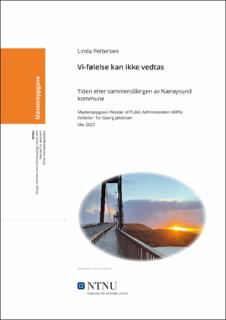| dc.description.abstract | I forarbeidene til siste kommunereform i Norge er det vurdert at identitet og tilhørighet har betydning for hvor mye innbyggerne vil engasjere seg som lokalpolitikere eller i frivillig arbeid. Hva med de ansattes identitet, eller vi-følelse som jeg har valgt å kalle det? Hva kan deres vi-følelse ha å si for tjenesteytingen, og hva påvirker ansattes vi-følelse?
Dette er bakgrunnen for temaet i min masteravhandling. Jeg har studert ansattes vi-følelse i en nylig sammenslått kommune. Ut fra kvalitativ tilnærming har jeg gjennomført en casestudie av Nærøysund kommune. Gjennom intervju og kommunens egen arbeidsmiljøkartlegging har jeg undersøkt hva som kan påvirke ansattes vi-følelse og hva kommunen har gjort for å etablere vi-følelse. Jeg har også sett på hvilken konsekvens vi-følelse kan ha for atferd, og følgelig tjenesteytingen. Funnene er analysert ved bruk av institusjonell teori, atferdsteori og andres forskning på identitet i forbindelse med sammenslåinger.
I studien finner jeg at det er flere forhold som påvirker identitet og vi-følelse. Felles prosjekter og felles mål virker samlende, og fremmer vi-følelsen. Organisasjonskultur, i betydning av «hvordan vi gjør ting her» står sentralt når to kommuner slår seg sammen. Ansatte identifiserer seg med måten arbeidet utføres på. Menneskene i organisasjonene er komplekse. I sammenslåingsprosessen kan det oppstå sterke følelser som utrygghet, urettferdighet og skuffelse. I den sammenheng utløser de ansatte forsvarsmekanismer for å beskytte egen identitet og selvfølelse, disse kan omfatte mistenksomhet og negativt snakk. Dette er forhold som oppfattes som hemmende for etablering av vi-følelsen i den nye kommunen. Organisasjonens omdømme har også betydning for vi-følelsen. Om de ansatte med stolthet kan identifisere seg med kommunen eller ikke, avhenger av kommunens gode eller dårlige omdømme.
Vi-følelse og tillit internt, vil gjøre at samhandling vil fungere mer effektivt. Med offentlig ansattes verdier og holdninger, vil de tilstrebe at innbyggerne får lik behandling, uavhengig av ansattes vi-følelsen i den nye kommunen. Noen forskjeller kan oppstå avhengig av den enkelte ansattes skjønn, bakgrunn eller tilhørighet i subkulturer.
Spesielt for tidspunktet for min undersøkelse er koronapandemien. Korona ble for Nærøysund et felles prosjekt som har samlet dem om et mål, og tvunget fram nye felles måter å utføre tjenesten på, som har virket fremmende for vi-følelsen på noen områder. Samtidig har nedstengningen som følge av samme pandemi, gjort at kulturbygging og det å bli kjent internt i organisasjonen, har måttet bli satt på vent, og følgelig hemmet utvikling av vi-følelsen for kommunen som helhet. | |
| dc.description.abstract | In the preparatory work for the latest municipal reform in Norway, it has been considered that identity and belonging have an impact on how much citizens wish to engage as local politicians or in voluntary work. The identity of employees and their sense of community is what I have chosen to call a ‘we-feeling’. I investigate how this ‘we-feeling’ is connected to the service sector, and what influences the employees’ sense of community?
This is the background for the topic in my master's thesis. I have studied employee we-feeling in a recently merged municipality. Based on the qualitative approach, I have conducted a case study of Nærøysund municipality. Through interviews, and the municipality's own work environment survey, I have investigated what may affect the employees’ we-feeling and what the municipality has done to establish a sense of collectivity. I have also looked at the impact that this we-feeling can have on certain behaviour, and consequently on the service sector. The findings have been analysed using institutional theory, behavioural theory and other research on identity in connection with mergers.
From the study, I find that there are several factors that affect identity and we-feeling. Joint projects and common goals seem to be unifying and promote we-feeling. Organizational culture, in the sense of "how we do things here" is central, when two municipalities merge. Employees identify themselves with the way the work is performed. The people who work within the organizations are complex. In the process of merging, strong emotions such as insecurity, injustice and disappointment may arise. In this context, employees trigger defense mechanisms to protect their own identity and self-esteem, which can include suspicion and negative talk. These are factors that are perceived as inhibiting the establishment of the we-feeling in the new municipality. The reputation of the organization also has an impact on the we-feeling. Whether the employees can proudly identify with the municipality or not, depends on the good or bad reputation of the municipality.
We-feeling and trust internally, will make interaction and cooperation more efficient. With the values and attitudes of public employees, they will strive to ensure that residents receive equal treatment, regardless of the employee's we-feeling in the new municipality. Some differences may occur depending on the individual employee's discretion, background or affiliation with subcultures.
This thesis was written during the Corona pandemic. For Nærøysund, Corona became a joint project that has brought the community together towards a common goal, forcing new collective ways of performing services, which has promoted the sense of we-feeling in some areas. At the same time, the shutdown, as a result of the same pandemic, has meant that building cultural connections and getting to know each other internally within the organization, have had to be put on hold. Consequently, the pandemic has hampered the development of the we-feeling for the entire municipality. | |
